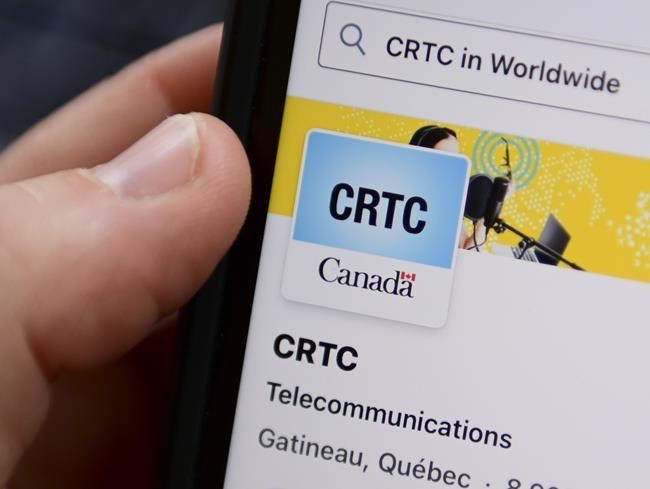
A person navigates to the on-line social-media pages of the Canadian Radio-television and Telecommunications Commission (CRTC) on a cell phone in Ottawa on Monday, May 17, 2021. New Brunswick-based rural internet company Xplore Inc. says a national framework that allows smaller providers to offer services to customers by using larger companies' fibre networks would give residents of remote regions more affordable options. THE CANADIAN PRESS/Sean Kilpatrick
Republished February 13, 2024 - 11:10 AM
Original Publication Date February 13, 2024 - 10:01 AM
A national framework that allows smaller internet providers to offer services to customers by using rivals' fibre networks would give residents of remote regions more affordable options, the industry regulator heard on Tuesday.
Rizwan Jamal, chief executive of New Brunswick-based Xplore Inc., said that although his company is seeking to expand its own fibre network in rural and remote areas, it faces a disadvantage competing with bigger carriers when it comes to scale.
"If we want to be able to be competitive from a price innovation perspective with the incumbents over time, it is absolutely critical for us to gain scale," Jamal told a panel of CRTC commissioners.
"Wholesale access will allow us to gain scale, especially in rural and remote Canada."
The federal telecommunications regulator is spending the week hearing from more than 20groups, including internet providers, advocates and other stakeholders as part of its review into internet competition in Canada.
The five-day hearing focuses on issues such as the current effectiveness of internet services markets, potential changes needed to boost competition, and how the CRTC can incentivize companies to invest in high-quality services.
The CRTC announced last November it would temporarily require large telephone companies, namely Bell Canada and Telus Corp., to provide competitors with access to their fibre-to-the-home networks in Ontario and Quebec within six months.
The decision was meant to stimulate competition for internet services in those provinces, where it noted that smaller providers have been increasingly bought up by bigger companies in recent years.
This week's hearing could affect whether the commission decides to make that direction permanent and apply it to other provinces.
Xplore's fibre internet network currently serves around 65,000 homes, a figure that the company hopes to grow to more than 400,000.
Jamal said the company can afford to build out its network in more densely populated communities with the support of federal and provincial subsidies, but in areas with less density, it can be difficult to achieve a return on investment.
Expanded wholesale rules could help fill in those service gaps, he said.
"Having this mandated access in communities close to or adjacent to the communities we are building will give us scale in those communities," said Jamal.
"Many of the communities that we service are small and we require local technicians. If they can service larger pockets of homes, it will help our return on investment … as well as offer competitive prices."
But if wholesale high-speed internet access is not mandated in rural areas, Jamal said local residents will fall behind.
"Over time, we would not have sustainable competition," he said.
"In those areas, they would be deprived of the benefits associated with this access being provided in urban and suburban areas, which would benefit those particular households with additional choice, additional competition and more affordable prices."
Other carriers such as Bell have spent the days leading up to the hearing arguing against an expansion of the CRTC's wholesale fibre access rules. Bell has said the temporary rules, which the company is appealing, already diminish the business case for it to invest.
Halifax-based carrier Eastlink also poured cold water on the idea during the company's appearance on Tuesday.
Executive vice-chair Lee Bragg said that if the CRTC prioritizes increasing internet choice for consumers while making it less attractive for companies to spend money to build networks, the result will be "decreased competition and lower quality networks, especially in smaller rural and remote communities."
"Without a wholesale framework that prioritizes the investments … Eastlink will be forced to reconsider our presence in some of our rural communities where the business case to continue investing no longer exists," Bragg warned.
He noted that in recent years, Eastlink has stopped providing service in 62 communities where it could no longer justify the costs.
"In rural and remote communities, the business case to provide service is already extremely challenging," said Bragg.
"These challenges can become insurmountable when there is a requirement to immediately provide wholesale Internet access, especially at rates that do not adequately cover the cost of delivering the service."
The CRTC is set to hear from Telus and Bell representatives on Wednesday.
This report by The Canadian Press was first published Feb. 13, 2024.
Companies in this story: (TSX:BCE, TSX:T)
News from © The Canadian Press, 2024